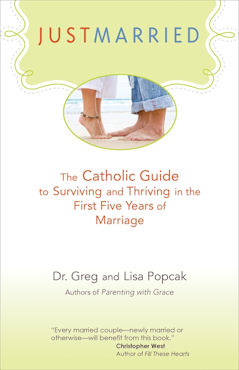
|
Posted November 5, 2013
Book: Just Married: The Catholic Guide to Surviving and Thriving in the First Five Years of Marriage Authors: Dr. Greg and Lisa Popcak Ave Maria Press. Notre Dame, IN. 2013. Pp. 247 An Excerpt from the Jacket:
The Popcaks combine decades of experience as counselors, the latest findings in marriage research, more than twenty years of marriage, and the wisdom of Catholic teaching to offer newly-weds a master plan for creating a strong bond in the first five years of marriage. An Excerpt from the Book: The Four Stages of Conflict Criticism Every couple complains about things in their marriage. Believe it or not, complaining about things in your marriage can actually be a positive and healthy activity. But when complaints become criticism, that's when the first stage of marital-communication collapse begins to threaten your ability to solve problems together and feel good about each other in conflict. What's the difference? A complaint is just an observation that either a need is not being met or things are not the way you would like them to be. Complaints simply and respectfully call attention to problems you would like to solve. Identifying Complains Exercise The following are examples of complaints that you hear in your home a lot.
In each of the above examples, the complaint represented the way one spouse called the other's attention to a problem that needed to be addressed. The complaint was nonpersonal, nonattacking, and thing focused (i.e., it addressed an event or situation that needed to change). Criticisms on the other hand are very personal, usually attacking, and spouse focused. Identifying criticism exercise Let's look at the same four situations we presented above, but this time we'll state them as criticisms.
Table of Contents: 1. Do you have what it takes? 2. Culture shock 3. The couple that prays together 4. The four stages of conflict 5. Managing conflict gracefully 6. Marriage enemy #1 7. First comes marriage 8. Money madness 9. Of outlaws and in-laws 10. Holy sex 11. Bring up baby? 12. Changing the world through your marriage 13. Staying in love for life |
|
